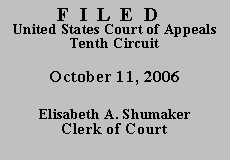

| UNITED STATES OF AMERICA, |
|
| v. | |
| ERICK DE PAZ, |
Mr. De Paz did not object to his sentence in the district court, so we review for plain error. United States v. Gonzalez-Huerta, 403 F.3d 727, 732 (10th Cir. 2005) (en banc), cert. denied, 126 S. Ct. 495 (2005). To establish plain error, Mr. De Paz must first demonstrate that there was an error in determining his sentence.
Although Mr. De Paz's sentence was determined by statute and not the Federal Sentencing Guidelines, he argues that the district court violated Booker by treating the statutory minimum sentence as mandatory. He claims that under 18 U.S.C. § 3553(a), the sentencing court was required to consider several mitigating factors which would have likely resulted in a lower sentence. However, when a defendant pleads guilty to a crime that carries a mandatory minimum sentence, the court has no discretion to do anything other than impose the sentence required by the statute. United States v. Cherry, 433 F.3d 698, 702 (10th Cir. 2005) (citing United States v. Payton, 405 F.3d 1168, 1173 (10th Cir. 2005)). The district court did not err in imposing the statutory minimum sentence.
Therefore, the judgment of the United States District Court for the District of Kansas, is AFFIRMED.
Entered for the Court,
Michael W. McConnell
Circuit Judge
*.After examining the briefs and appellate record, this panel has determined unanimously that oral argument would not materially assist in the determination of this appeal. See Fed. R. App. P. 34(a)(2); 10th Cir. R. 34.1(G). This case is therefore submitted without oral argument. This order and judgment is not binding precedent, except under the doctrines of law of the case, res judicata, and collateral estoppel. The court generally disfavors the citation of orders and judgments; nevertheless, an order and judgment may be cited under the terms and conditions of 10th Cir. R. 36.3.